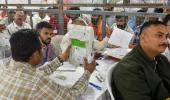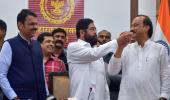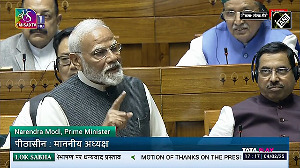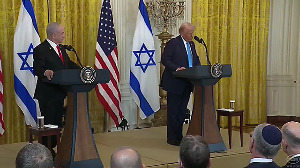...'hum decide karenge kaun banega mukhyamantri. This decision is not to be taken in Mumbai.'

"Modiji and Amit Shahji in Delhi decide kaun banega mukhyamantri. Fadnavis may think it is a walkover and he is CM, but they have given the green signal," says Rajdeep Sardesai, consulting editor of the India Today Group.
Sardesai, one of India's leading journalists is in Mumbai to promote his latest book 2024 The Elections That Surprised India. This is his third book in the election series following his previous two -- 2019: How Modi Won India and 2014: The Election That Changed India.
In a conversation with Rediff.com's Archana Masih, Sardesai speaks about what surprised him most about all the elections conducted this year -- and how the BJP course-corrected to win a massive victory in Maharashtra after a crushing defeat in the Lok Sabha election five months ago.
Part 1 of a multi-part interview:
Your book is titled 2024 The Election That Surprised India. What surprised you more -- the BJP's tally in June or the Mahayuti's victory in Maharashtra in November?
The result that surprised me most in 2024 was Haryana.
I had travelled through Haryana and did not see the BJP winning and Congress losing.
The second surprise was the General Election. Very, very few people told me that the BJP will not get 272. A large number of people were carried away by the '400 paar' hype, so it was a surprise when the BJP got 240.
The result in Maharashtra was least surprising. I expected the Mahayuti to win, but not with such a big margin.

What was it about Haryana that surprised you and what in your opinion were the reasons for it?
The Haryana election came a few months after the Lok Sabha.
The general mood in Haryana after ten years of BJP rule was that people wanted change in government. But the BJP strength is that even when the mahaul (mood) is against them, they are able to do the micro-management and micro-planning needed in a small state like Haryana.
For example, target specific Dalit, OBC, Sikh groups. Maybe have 10 Jat candidates pitted against a Congress Jat candidate or give ticket to another candidate so that Jat vote gets divided etc.
Meanwhile, the complacency and over confidence of the Congress cost them the election.
Haryana was the ultimate self-goal for the Congress.

You mention in the book that local issues like farmers' anger and Maratha reservation reduced the BJP to single digits in Maharashtra, but such local concerns did not matter in the state election five months later, how do you account for that?
No two elections are the same.
At the time of the Lok Sabha election there was a lot of anger among the onion farmers about the ban of onion exports which had a huge impact in north Maharashtra.
There was a fear among Dalits about the Constitution being changed resulting in loss of reservation for them.
There was a general sense that the RSS was unhappy about Ajit Pawar being part of the alliance.
The BJP was overconfident and complacent that they would win in Modi's name.
But after the Lok Sabha election, the BJP course-corrected. It realised its weaknesses -- addressed the concerns of the onion farmers, dealt with agrarian distress to some extent and introduced the Laadki Behan scheme. Providing Rs 1,500 for more than 2 crore women in Maharashtra was a game changer.
They got their ground game together and targeted booths where they were weak. They worked among OBC groups to counter the Maratha reservation card.
They worked for four months, while the Opposition fought with each other. The headline of August, September, October was 'Kaun banega mukhyamantri'.
It was almost as if they thought that they had won the election.
Maharashtra is a classic example that if you course-correct, don't take the voter for granted, are willing to learn from your mistakes and don't get complacent -- you can even win what appeared to be a losing election five months ago.
On the other side, if you are overconfident you can lose. What is true of the Mahayuti, the equal and opposite is true for the Maha Vikas Aghadi which went the other way.
The fact that it happened in five months is unique. India is unique -- the same voter who voted for the MVA in the Lok Sabha may vote for the Mahayuti in the Vidhan Sabha.
We saw this in Nanded even in this election where the Lok Sabha has been won by the Congress and all six assembly seats by the BJP and allies.
The voter had different concerns for the Lok Sabha compared to the Vidhan Sabha.

What was happening with the Congress about 'kaun banega mukhyamatri' has been happening to the Mahayuti since the past 11 days despite a massive win?
The Mahayuti will make Devendra Fadnavis the chief minister.
The issue is about who gets what portfolio.
The other big reason that has led to this situation is that Delhi wants to send a message to Mumbai that hum decide karenge kaun banega mukhyamantri. This decision is not to be taken in Mumbai.
Modiji and Amit Shahji sitting in Delhi will decide kaun banega mukhyamantri. Fadnavis may think it is a walkover and may very well think he will become CM, but we have given the green signal.
There is a bit of posturing also there.

You say in your book that the Election Commission has functioned as the 12th man of the BJP?
Losing parties have questioned the EC in the past. The EC's credibility appears to have suffered a blow. How can it be restored?
There are two parts of what you say: A lot of Opposition parties use the EC to hide their own inadequacies and failures. To some extent that is happened to the Opposition in Maharashtra and even in Haryana.
But at the same time I think the Election Commission has shown a complete lack of transparency which leads people to suspect the worst about them. Even if they are making a genuine effort, people don't believe them anymore.
For example, why can't they tell why it took them ten days to come out with the final voting figure for round one of the General Elections?
Why can't they give in real time booth-wise figures rather than saying that they will give it at 11.30 pm? The EC needs to get its act together.
The EC needs to be open and transparent to restore its credibility. It should make data available if they have nothing to hide.
There is not enough proof to say that EVMs are manipulated. I have seen ballot boxes being stolen in Mumbai's Bhendi Bazaar so I don't have great remembrance of ballot boxes.
But if EC is unable to answer questions in the public domain more effectively, then a day will come when people will say 'bas ho gaya, nahi chahiye', please go back to the ballot boxes.
What prevents the EC from calling all parties before and after elections and putting all the answers to their questions on their Web site?
I call them the 12th man after seeing their performance in the last Lok Sabha election. In Maharashtra, why did they have a 5-phase election in the Lok Sabha and one phase in the Vidhan Sabha?
There is no history of violence during election here, but they wanted it in 5 phases thinking it will tire out the Opposition.
Is the schedule being decided in the Election Commission of India or the PMO? It is a perceptional problem. They may be meaning well, but perceptionally have taken a huge hit.
- Part 2 of the Interview: 'BJP Is A Powerful Machine'
Feature Presentation: Aslam Hunani/Rediff.com











 © 2025
© 2025